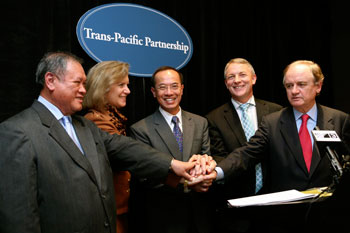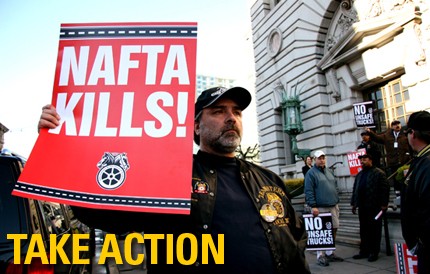US tries to build consensus for trans-Pacific trade talks

Wall St Journal | 3 June 2010
US tries to build consensus for trans-Pacific trade talks
By Tom Barkley, Dow Jones Newswires
WASHINGTON (Dow Jones) — The Obama administration is pressing ahead with trade expansion in the Asia-Pacific region, even as it struggles to build consensus with labor and business groups.
The U.S. is hosting the second round of talks in mid-June on the Trans-Pacific Partnership, which it is holding up as a "21st century" free-trade agreement that can achieve the economic benefits of global integration while protecting labor and environmental rights.
To build support for the trade partnership, U.S. Trade Representative Ron Kirk and other trade officials are conducting a 50-state listening tour. They also invited anyone who submitted public comments on the agreement to meet with negotiators from the U.S. and other countries during the second round of talks in San Francisco June 14-18.
The trade zone would cobble together four countries that already have free-trade deals with the U.S.—Singapore, Chile, Australia and Peru—along with New Zealand, Brunei and Vietnam.
The Obama administration sees the relatively modest regional deal as a way to break the domestic logjam on trade and position the U.S. to compete in the fast-growing region. It wants the trade partnership to encompass new initiatives to promote regional supply chains and regulatory cooperation, while also making labor and environmental rights a priority.
"It reflects the way companies are going to be doing business over the coming years, but also reflects the values of this administration," a senior trade official said in an interview.
The outreach effort is earning plaudits from both sides of the debate, but business and labor groups remain wary.
"An odd thing about the Obama trade policy is that it seems to engender a lot of discomfort on both labor and the business side," said Thea Lee, deputy chief of staff for the AFL-CIO.
One of the main questions to be ironed out among negotiators in round two is how the trade partnership will relate to overlapping bilateral deals with some of the same countries.
The senior trade official said other trading partners agree with the need to maintain the commitments of the previous deals, or even to exceed them.

But preserving the best of existing deals can means different things to different people, said Lee.
While unions are pushing for more stringent labor, environmental and investment provisions, business groups warn that loading too many conditions on top of existing trade pacts will be a deal-breaker for other countries.
Frank Vargo, vice president of international economic affairs at the National Association of Manufacturers, said he hopes a "21st century" agreement means maximizing market access. But he said he worries that the term "could be code" for tough labor and environmental standards.
Business groups have watched with alarm as U.S. legislation introduced last year in Congress requiring new and existing trade agreements to include such standards has attracted 144 co-sponsors. But Vargo said he doesn’t expect the administration to use the bill as a template for the trade partnership.
Bill sponsor Rep. Michael Michaud (D., Maine) said the Trade Act reflects the policies that a majority of House Democrats would like to see incorporated into the partnership.
Michaud said a March meeting with Trade Representative Kirk was an encouraging sign that the administration is committed to consulting with Congress, but he lamented the lack of specifics.
USTR spokesman Carol Guthrie said the administration has been working with Trade Act sponsors on a "positive trade agenda" as part of the broad outreach effort.
A senior House Republican aide praised the level of inclusiveness, as well, but said tough decisions will have to be made at some point.
"Our members are anxious to get into the substantive part of the negotiations," the aide said, with hopes that a deal can be completed by the time the U.S. hosts the Asia-Pacific Economic Cooperation trade ministerial meeting in May 2011.





